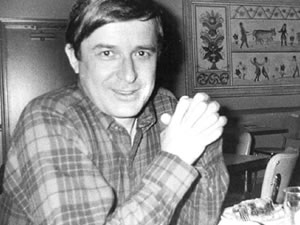E. M. Cioran
(1950-1991) Historian of religions, philosopher and writer
 Ioan P. Culianu (or Couliano) (1950-1991) was a historian of religions, philosopher and writer of Romanian origin.
He was born in 1950 in Iasi, the capital of the historical province of Moldova, in a distinguished family of scholars and scientists. In 1967, he moved to Bucharest to study at the University of Bucharest in the Faculty of Letters (Facultatea de Litere), specialising in Italian literature. In 1972, he obtained a summer scholarship to study at Perugia in Italy; while he was there, he made the decision to defect and was forced to spend several months in a refugee camp. After being granted asylum, Culianu undertook postgraduate studies in the History of Religions at the Catholic University of the Sacred Heart (Università Cattolica del Sacro Cuore) in Milan (1973-1976). He obtained his PhD in 1976 with a thesis on Hans Jonas and scholarly studies of Gnosticism. In 1974, he met Mircea Eliade, the famous Romanian historian of religion, whom he had admired since he was an undergraduate student. The two became friends, with Eliade considering him as a natural heir. Hence he became a driving force in Culianu’s career, facilitating his scholarly ascension. After Eliade’s passing in 1986, Culianu became his literary executor.
In 1976, Culianu accepted a lectureship at the newly established Romanian Studies section within the Romance Languages department at the University of Groningen (Netherlands). In parallel, he pursued and concluded two other doctorates at the University of Paris, Sorbonne. With Eliade’s support, in 1986 Culianu became Visiting Professor at University of Chicago’s Divinity School, and subsequently Associate Professor (1988). However, only three years later, on 21 May 1991, Culianu was assassinated at University of Chicago; his murder was never solved. His dramatic end made the object of an investigation by U.S. journalist Ted Anton, published in 1996 as Eros, Magic and the Murder of Professor Culianu. It has been speculated that his murder was accomplished by former Securitate (Romanian Secret Police) agents in response to a series of inflammatory articles Culianu wrote against the post-Revolution regime and the ascension of the far right in Romania.
The monograph Culianu is mainly remembered for is Eros and Magic in the Renaissance, published in 1984 in French and subsequently translated in English (1987). His controversial thesis was that Renaissance magi such as Marsilio Ficino, Pico della Mirandola and particularly Giordano Bruno had developed a sophisticated understanding of the power of imagination over the human mind. This knowledge was, however, banished due to a phenomenon he called ‘the censorship of the imagination’, undertaken first by the Reformation and then by its offspring, modern science. For Culianu, this process resulted in a profound alteration of worldview that ushered in the modern age.
In addition to this seminal study, Culianu also published several other scholarly studies, chiefly Out of this World: Otherworldly Journeys from Gilgamesh to Albert Einstein (1991) and Tree of Gnosis: Gnostic Mythology from Early Christianity to Modern Nihilism (posthumous, 1992). His latter works evidence a growing interest in the application of cognitive science to history of religions. He argued that a religious phenomenon, such as Gnosticism, could be derived from a simple set of logical rules that flourish in a tree-like pattern. Culianu has also authored several short stories and novels (Tozgrec, The Emerald Game, Art of the Fugue).
Article by Jo Hedesan
|

